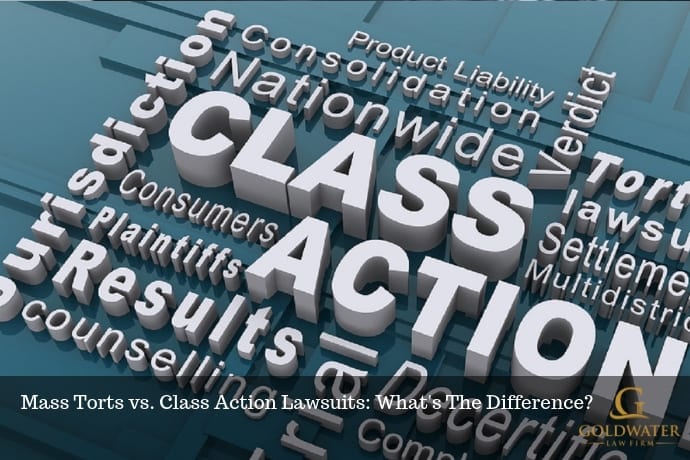– Updated on August 18, 2025
A Mass Tort Lawyer Can Help You Better Understand These Two Types of Legal Action
Both mass tort and class action are types of litigation that allow injured people to seek compensation. Due to their many similarities, these two types of procedural action are often confused.
For example, both class action and mass tort cases are made up of a group of plaintiffs who have allegedly been harmed by a common defendant. These claims are consolidated into one action in order to optimize time and help individuals with similar cases navigate our nation’s court system in a more efficient way.
So, what’s the difference between mass torts and class action lawsuits?
Below, we explain the key differences and everything you need to know about these two types of litigation. If you’ve been harmed and believe you might have a class action or mass tort claim, it can be overwhelming and difficult to know where to begin. Speaking with an experienced mass tort lawyer will be in your best interest.
What’s the Difference Between a Mass Tort and Class Action?
The Primary Difference
The main distinguishing factor between mass tort and class action lawsuits lies in how the plaintiffs are treated. While both involve a group of plaintiffs filing over a shared grievance, plaintiffs in a mass tort lawsuit are viewed differently than in a class action suit.
All the plaintiffs in a class action lawsuit are considered a ‘class’ and are treated as one plaintiff. A representative, known as the lead plaintiff, is chosen and sues the defendant on behalf of the entire group.
In contrast, each plaintiff in a mass tort lawsuit is treated as an individual. Although plaintiffs in a mass tort are part of a group, they must individually establish how they were harmed by the defendant’s actions.
Mass torts often involve a group of distinct individuals who are sometimes from the same geographic area. With this in mind, mass tort cases typically consist of a smaller group of injured plaintiffs than a class action suit.
Class Action
Class action lawsuits tend to be highly specific. Since the group of individuals is technically seen as one plaintiff, class action lawsuits have certain characteristics or criteria that must be met.
The Federal Rules of Civil Procedure outline the following criteria for all class action lawsuits:
- The class is so numerous that joinder of all members is impracticable.
- There are questions of law or fact common to the class.
- The claims or defenses of the representative parties are typical of the claims or defenses of the class.
- The representative parties will fairly and adequately protect the interests of the class.
Schedule A Free Case Review!
Mass Tort
Mass tort action is usually taken when similar individual claims are not certified to proceed as a class action because one or more of the criteria don’t apply. For example, a mass tort can be established if the details between the members of the group are too different.
While the plaintiffs of a mass tort lawsuit are filing against the same defendant, the circumstances of each individual case can vary. Many times, mass tort claims involve a group of consumers that have suffered injuries after using the same defective product. However, the injuries or side effects that result from the product may differ from person to person, so the claims cannot be filed as a class action lawsuit and treated as one plaintiff.
In this case, the individual mass tort claims are grouped together for pre-trial proceedings in order to conserve time and resources. This process is often explained in Mass Torts FAQs and can be done in either state court or federal court through multidistrict litigation (MDL). At the end of the pre-trial proceedings, the individual lawsuits return to the jurisdictions in which they were filed for trial.
Some examples of past mass torts in the United States include asbestos exposure, pharmaceuticals, and medical devices.
Determining the Best Action for Your Case
While these are the basic differences between mass tort and class action litigation, there are other factors used to determine whether a case should be pursued as one or the other.
Many people who have suffered an injury or medical condition at the hands of a negligent corporation aren’t sure how to proceed. If you need help understanding which of these complex legal concepts is best suited for your case, call the Goldwater Law Firm. We’re dedicated to holding companies that put profits before their consumers responsible.
You can contact our law firm at 866-984-9782, or fill out our contact form to schedule a free consultation with an experienced mass tort lawyer.

The Goldwater Law Firm is on mission to help as many people as possible with the fierce, compassionate legal aid only The Gold Standard of Injury Law can offer. If you suffered serious side effects or were diagnosed with an illness because of a defective drug or product, or if you were injured in an accident that wasn’t your fault, Attorney Bob Goldwater and the Goldwater Law Firm is ready to serve as your compassionate partner in the fight to seek the compensation and justice you deserve.
Share this post:





